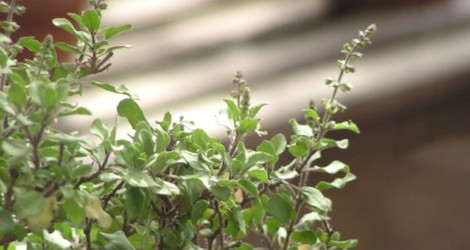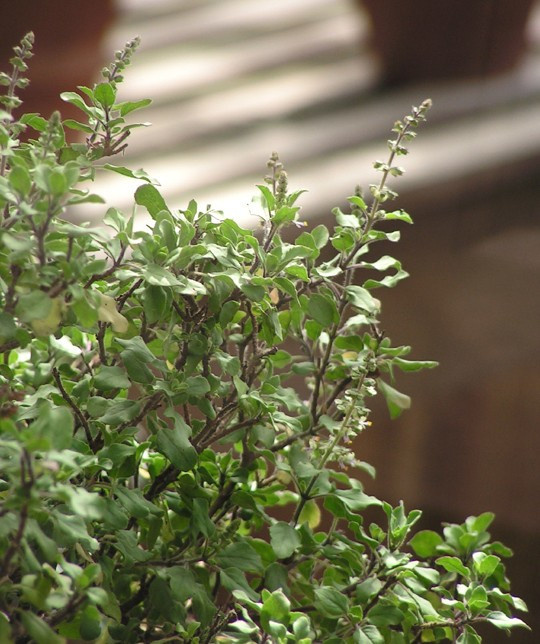Accession Data
Ocimum tenuiflorum
Common Name: Holy Basil
Family: Lamiaceae
Synonym(s): Ocimum sanctum L.
Country of Origin: Trop. & Subtrop. Asia to N. Australia
Uses: Tulasi is cultivated for religious and medicinal purposes, and for its essential oil. It is widely known across the Indian subcontinent as a medicinal plant and an herbal tea, commonly used in Ayurveda, and has an important role within the Vaishnava tradition of Hinduism, in which devotees perform worship involving holy basil plants or leaves. This plant is revered as an elixir of life.3
Modern Studies have shown Holy Basil to protect the body from chemical stresses, pollution, toxicity and heavy metals.
It has shown to have antimicrobial and antibacterial properties. Used to sanitize cuts and wounds, ulcers, and mouth sores.
This plant is traditionally used to regulate blood sugar and blood pressure. Used as a purifier and tonic.
Tulsi is an anxiolytic and anti-depressant, aides in balancing hormones and development of the brain. This plant has been found to help with memory, cognitive learning, anxiety and depression.
This plant traditionally is known as a very holistic plant, covering a large variety of ailments in all respects: eye disorders, back pain, skin disease, ring worm, snake bites, muscle stiffness, etc.
Normalizes Kapha and Vata
Accession Data
USDA Zone: 10b-11
Accession #: 201500040
Accession Date: 2015-05-29 00:00:00
Bloom Status: 🪴 Not Flowering
Location: 1201
Quantity: 1
Source: Rob Nicholson - Smith College
Classification
Division: Magnoliophyta
Class: Magnoliopsida
Subclass: euasterid I
Order: Lamiales
Family: Lamiaceae
SubFamily: Nepetoideae
Tribe: Ocimeae
SubTribe: Ociminae
Flowering Data:
This accession has been observed in bloom on:| Year | Jan | Feb | Mar | Apr | May | Jun | Jul | Aug | Sep | Oct | Nov | Dec | ||||||||||||||||||||||||||||||||||||||||
|---|---|---|---|---|---|---|---|---|---|---|---|---|---|---|---|---|---|---|---|---|---|---|---|---|---|---|---|---|---|---|---|---|---|---|---|---|---|---|---|---|---|---|---|---|---|---|---|---|---|---|---|---|
| 2026 | ||||||||||||||||||||||||||||||||||||||||||||||||||||
| 2025 | ||||||||||||||||||||||||||||||||||||||||||||||||||||
| 2024 | ||||||||||||||||||||||||||||||||||||||||||||||||||||
| 2023 | ||||||||||||||||||||||||||||||||||||||||||||||||||||
| 2022 | ||||||||||||||||||||||||||||||||||||||||||||||||||||
| 2021 | ||||||||||||||||||||||||||||||||||||||||||||||||||||
| 2020 | ||||||||||||||||||||||||||||||||||||||||||||||||||||
| 2019 | ||||||||||||||||||||||||||||||||||||||||||||||||||||
| 2018 | ||||||||||||||||||||||||||||||||||||||||||||||||||||
| 2017 | ||||||||||||||||||||||||||||||||||||||||||||||||||||
| 2016 | ||||||||||||||||||||||||||||||||||||||||||||||||||||
| 2015 | ||||||||||||||||||||||||||||||||||||||||||||||||||||
References
- The Plant List (2013). Version 1.1. Accessed 29 May 2015.
- WCSP (2015). World Checklist of Selected Plant Families. Facilitated by the Royal Botanic Gardens, Kew. Accessed 29 May 2015.
- Ocimum tenuiflorum at Wikipedia. Accessed 29 May 2015.
- Marc Maurice Cohen Tulsi - Ocimum sanctum: A herb for all reasons J Ayurveda Integr Med. 2014 Oct-Dec; 5(4): 251–259. Last accessed on Thursday, February 15, 2018.
- Image #00 (cropped) & #01 (original) by en:User:GourangaUK [Public domain], via Wikimedia Commons. Last accessed Wednesday, 14 November, 2018.
Images


